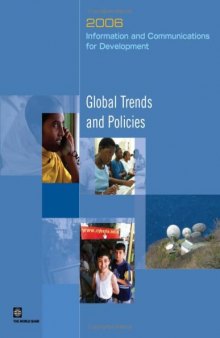 جزییات کتاب
جزییات کتاب
"The report is essential reading for policy makers, government workers, and academics pursuing the goal of equitable, sustainable development across the world." - N. R. Narayana Murthy, Chairman and Chief Mentor Infosys Technologies Ltd. Information and communication technology (ICT) is rapidly evolving, changing rich and poor societies alike. It has become a powerful tool for participating in the global economy and for offering new opportunities for development efforts. ICT can and should advance economic growth and reduce poverty in developing countries. It has been 20 years since the first telephone operator was privatized, a little over 10 since the World Wide Web emerged, and 5 since the telecommunications bubble burst. How have the ICT sector and its role in development evolved? What have we learned? How can we move forward? Information and Communications for Development 2006: Global Trends and Policies contains lessons from both developed and developing countries. It examines the roles of the public and private sectors, identifying the challenges and the benefits of adopting and expanding ICT use. The report assesses topics essential to building an information society, including investment, access, diffusion, and country policies and strategies. Assessing what has worked, what hasn't, and why, this report is an invaluable guide for understanding how to capture the benefits of ICT around the world.
 درباره نویسنده
درباره نویسنده

بانک جهانی یک موسسه مالی بینالمللی است که به منظور پیگیری پروژههای سرمایهای، به دولتهای کشورهای کمدرآمد و متوسط وام اعطا میکند. این مرکز شامل دو مؤسسه است: بانک بینالمللی بازسازی و توسعه (IBRD) و انجمن توسعه بینالملل (IDA). بانک جهانی بخشی از گروه بانک جهانی است و یکی از سه رکن برتون وودز را تشکیل میدهد.
 دانلود کتاب
دانلود کتاب
 جزییات کتاب
جزییات کتاب
 درباره نویسنده
درباره نویسنده
 بانک جهانی یک موسسه مالی بینالمللی است که به منظور پیگیری پروژههای سرمایهای، به دولتهای کشورهای کمدرآمد و متوسط وام اعطا میکند. این مرکز شامل دو مؤسسه است: بانک بینالمللی بازسازی و توسعه (IBRD) و انجمن توسعه بینالملل (IDA). بانک جهانی بخشی از گروه بانک جهانی است و یکی از سه رکن برتون وودز را تشکیل میدهد.
بانک جهانی یک موسسه مالی بینالمللی است که به منظور پیگیری پروژههای سرمایهای، به دولتهای کشورهای کمدرآمد و متوسط وام اعطا میکند. این مرکز شامل دو مؤسسه است: بانک بینالمللی بازسازی و توسعه (IBRD) و انجمن توسعه بینالملل (IDA). بانک جهانی بخشی از گروه بانک جهانی است و یکی از سه رکن برتون وودز را تشکیل میدهد. 








 این کتاب رو مطالعه کردید؟ نظر شما چیست؟
این کتاب رو مطالعه کردید؟ نظر شما چیست؟
